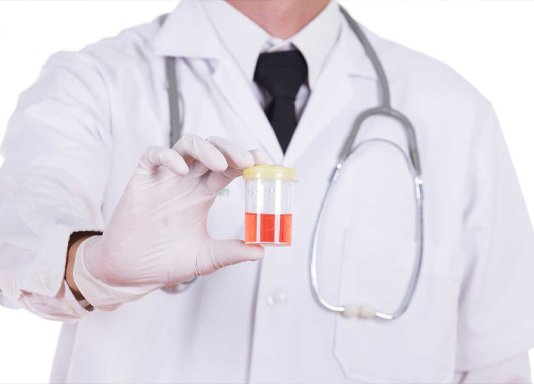While in many circumstances the condition heals itself and the cause is harmless, hematuria (blood in urine) can indicate an underlying serious condition. There are are two types of hematuria: gross hematuria (visible blood in the urine) and microscopic hematuria (blood in urine that is not visible and can only be seen under a microscope). In either case, it is important to get tested to diagnose the cause.
Symptoms of hematuria
Gross hematuria is cola-colored or pinkish. You will notice a change in hue if your urine contains blood. Normally, urine color falls between pale yellow to dark amber. The condition is usually painless; however, blood clots in the urine can be painful. There are no other discernible signs apart from the changed hue and tests are required to investigate the underlying cause.
Causes of hematuria
Hematuria occurs when your kidneys fail to function properly resulting in leakage of blood cells into the urine. There are a number of issues that can cause this leakage, which include:
- Urinary tract infections: UTI occurs when bacteria enter the bladder through the urethra. UTI symptoms include pain during urination, foul-smelling urine and blood in the urine.
- Kidney infections or pyelonephritis: These infections usually occur when the bacteria enter the kidneys through the bloodstream or through the ureters. Symptoms of kidney infections are usually similar to bladder infections with an exception that kidney infections sometimes cause fever.
- Kidney or bladder stones: When the body does not have enough water, the minerals become small crystals and inhabit the walls of the bladder or any of the kidneys. This can sometimes become a cause for both gross and microscopic hematuria.
- Enlarged prostate: The prostate gland can become enlarged in men as they reach a certain age. This enlargement compresses the urethra which blocks the urine flow causing blood in the urine, pain during urination, and persistent need to urinate. Following are the main causes of enlarged prostate:
- Urinary tract infection
- Old age
- Prostatitis
- Urethral stricture
- Scarring in the bladder due to any previous surgery
- Kidney or bladder stones
- Hormonal imbalance
- Nerves problems that control the bladder function
- Prostate cancer
- Kidney disease. Glomerulonephritis can usually cause microscopic bleeding. It’s onset is linked with diabetes but sometimes it can occur on its own. Either way, it can lead to microscopic bleeding in the urine.
- Cancer: Another very rare cause of blood in the urine could be an advanced stage of kidney, prostate or bladder cancer. Unfortunately, there are no apparent signs that would warn you about cancer before it reaches its maturity.
- Inherited disorders: Disorders like sickle cell anemia can cause both gross and microscopic hematuria. Similarly, other inherited disorders like Alport syndrome can also cause blood in the urine.
- Kidney injury: Injuries to the kidney can also lead to blood in the urine. This usually happens when someone goes through an accident that causes serious trauma to the areas near or around the kidneys.
- Medications: Some medications including the anti-cancer drug penicillin and cyclophosphamide can lead to urinary bleeding.
- Strenuous exercise: It is very unlikely that exercise would ever cause hematuria. But it is possible in athletes and those who engage in hard-core exercises that can cause trauma to the organs.
Treatments for Blood in the Urine
There are a number of techniques used by urologists in Dubai to eliminate the condition and its many symptoms and causes. Some of these treatments include:
- Sclerotherapy for erectile dysfunction
- Stem Cells therapy
- Shock wave therapy
- Microscopic varicocele repair
- Doppler Ultrasound with testicular/prostatic
Final thoughts: In older people, blood in the urine is usually microscopic hematuria. Both types of hematuria can occur at any age, but luckily it can be treated if it isn’t caused by life-threatening diseases. The best thing you can do is to reach out to your healthcare provider right away and diagnose the issue before it becomes any worse. German medical center in Dubai offers unique and effective treatments to offer a quick relief from various diseases that may be a cause of blood in the urine. Talk to a specialist today to learn more about your symptoms and diagnose the underlying cause for a timely treatment.



















